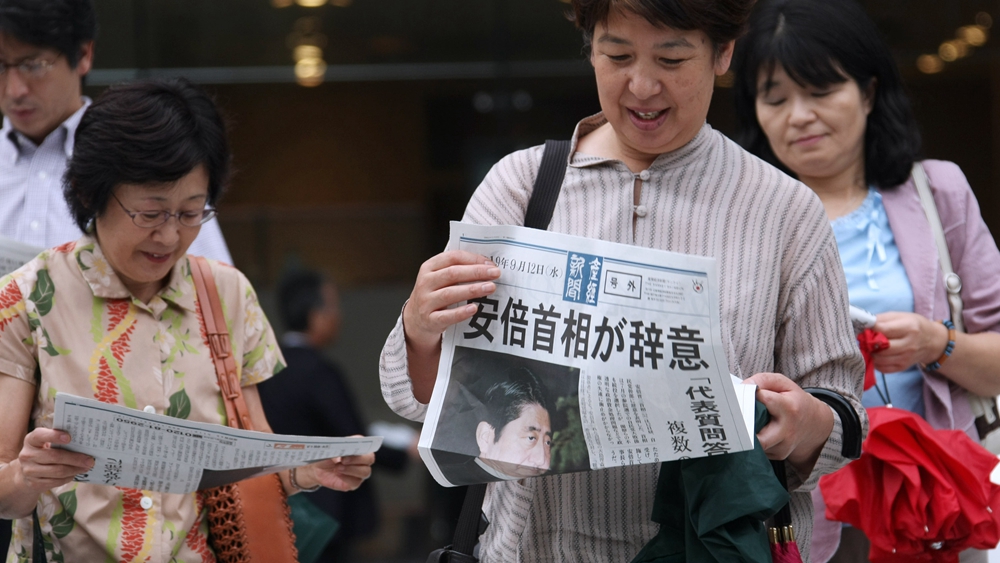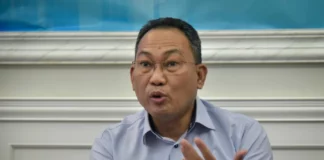Tokyo August 29 CGTN News — Japanese Prime Minister Shinzo Abe, the country’s longest-serving leader, announced at a press conference on Friday that he has decided to step down due to health reasons.
“Now that I am not able to fulfill the mandate from the people with confidence, I have decided that I should no longer occupy the position of the prime minister,” Abe said.
The 65-year-old politician battled ulcerative colitis disease for years, and two recent hospital visits within a week had fanned questions on whether he could stay in the job until the end of his term as leader of the ruling Liberal Democratic Party (LDP), and hence, premier, in September 2021.
During his first tenure as prime minister, which started in late September 2006, Abe abruptly stepped down from his post in 2007 due to chronic ulcerative colitis. He returned as prime minister for a rare second term in December 2012, pledging to revive growth with his “Abenomics” mix of hyper-easy monetary policy, fiscal spending and reforms. He also pledged to beef up Japan’s defense and aimed to revise the pacifist constitution.
Abe said his health started declining around mic-July, and he did not want it to impact on important policy decisions. 03:52
“I apologize from the bottom of my heart that despite all of the support from the Japanese people, I am leaving the post with one full year left in my term and in the midst of various policies and coronavirus,” he said.
Abe said that he would remain in office until his successor is chosen. The LDP will decide next week on how to hold a leadership election, with parliamentarians and representatives of local chapters likely casting ballots, according to local media reports.
Abe, who on Monday surpassed the record for the longest consecutive tenure as Japan’s premier set by his great-uncle Eisaku Sato half a century ago, said at the press briefing that he will continue his political career and will run in the next election “as a member of the House of Representatives” in the National Diet – Japan’s parliament.
Support rates fall over COVID-19 responses
Under fire for his handling of the novel coronavirus pandemic and scandals among party members, Abe has recently seen his support fall to the lowest levels in his nearly eight years in office.
Japan has not suffered the explosive surge in virus cases seen elsewhere, but Abe has drawn fire for a clumsy early response and what critics see as a lack of leadership as infections spread.
In the second quarter, Japan was hit by its biggest economic slump on record as the pandemic emptied shopping malls and crushed demand for cars and other exports, bolstering the case for bolder policy action to avert a deeper recession.
Abe kept his promises to strengthen Japan’s defense, boosting spending on the military after years of declines and expanding its capacity to project power abroad.
In a historic shift in 2014, his government re-interpreted the constitution to allow Japanese troops to fight abroad for the first time since World War II.
A year later, Japan adopted laws scrapping a ban on exercising the right of collective self-defense or defending a friendly country under attack.
But Abe proved unable to revise the U.S.-drafted, post-war constitution’s pacifist Article 9, a personal mission that also eluded his grandfather, Kishi Nobusuke, who quit as premier in 1960 because of the uproar over a U.S-Japan security pact.03:40

Ups and downs in China-Japan relations
In response to a question about Abe’s plan to resign, Chinese Foreign Ministry spokesperson Zhao Lijian said on Friday that it is an internal affair of Japan and that China will not comment.
“China and Japan are close neighbors,” Zhao said at a regular press briefing. “China is willing to make joint efforts with Japan to continue to promote the improvement and development of bilateral ties.”



















